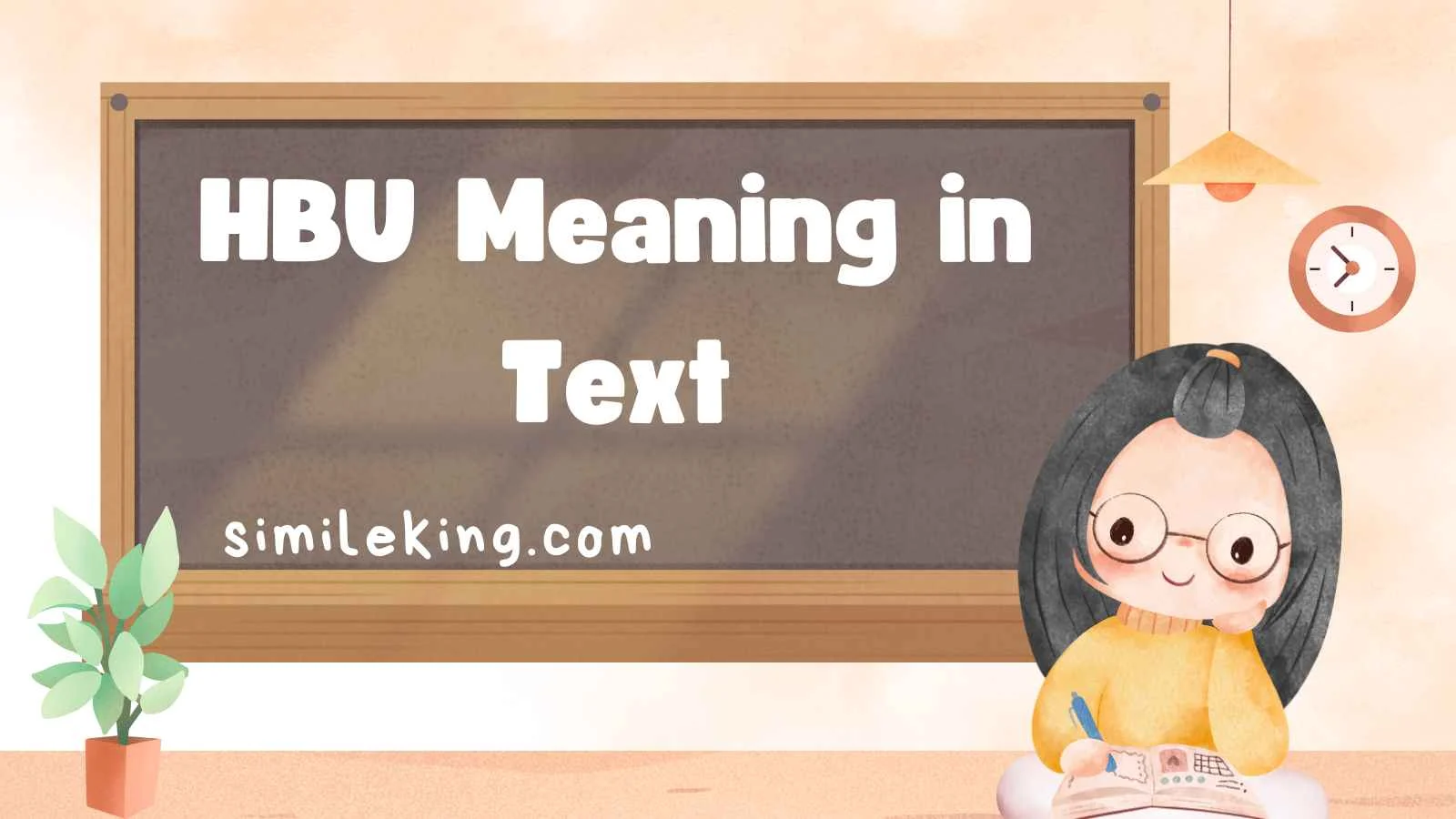In 2025, digital conversations move faster than ever. Whether it’s texting, chatting on Instagram, dropping a message in Discord, or engaging in professional workplace communication tools like Slack, abbreviations rule modern conversations. One of the most common shorthand terms you’ll see is HBU.
If you’ve received a message like:
- “I’m good, hbu?”
- “Hey, hbu with the project update?”
- “Chillin rn. Hbu?”
—you might pause for a second and wonder: what exactly does HBU mean in text?
This article will break it all down for you with 2025-updated insights, fresh examples, and superior explanations that go beyond surface-level definitions. You’ll not only understand what HBU stands for, but also how to use it politely, professionally, and casually depending on the situation. By the end, you’ll know when to use it, when to avoid it, and what better alternatives might fit your context.
What Does HBU Mean in Text?
HBU stands for “How About You.”
It’s one of the most common digital abbreviations used in texting, online chatrooms, and social media platforms. People use it as a quick way to bounce a question back to the other person after sharing something about themselves.
👉 Example:
- A: “I’m feeling better now, thanks for asking.”
- B: “Glad to hear that! HBU?”
Here, HBU is a polite way of asking the other person how they’re doing without repeating the full phrase “How about you?”
Why HBU Is So Popular in 2025
In digital communication, brevity is everything. The rise of real-time chat apps, texting culture, and short-form communication makes abbreviations like HBU thrive. Here are a few reasons it’s especially popular in 2025:
- Speed & Convenience – Typing “hbu” is faster than spelling out the full phrase.
- Casual Tone – It feels friendly and conversational, perfect for peers and friends.
- Universal Understanding – By now, nearly everyone familiar with texting culture knows what HBU means.
- Cross-Platform Use – From TikTok comments to LinkedIn DMs, HBU has adapted to multiple contexts.
- Emoji Pairing – In 2025, people often pair it with emojis for tone: “I’m good 😎 hbu?”
Formal vs. Casual vs. Professional Use of HBU
While HBU is widely recognized, its appropriateness depends heavily on who you’re texting and the context. Let’s explore how its tone shifts.
1. Casual Conversations
- Perfect for friends, siblings, partners, or social media exchanges.
- Often paired with slang or emojis.
Example:
- “I’m just chilling at home rn. Hbu?”
2. Semi-Formal Conversations
- Works with colleagues or classmates if the setting is relaxed.
- Best used in messaging apps, not in official emails.
Example:
- “I’ve finished my part of the project. Hbu with your section?”
3. Professional Conversations
- Generally avoid abbreviations like HBU in formal business emails.
- Instead, write “How about you?” or “What about your progress?” for clarity.
Example (NOT ideal):
- “I submitted the report. HBU?” ❌
Better alternative:
- “I submitted the report. How about your section?” ✅
Alternatives to HBU in Different Contexts
If you want to sound more professional, polite, or creative, here are excellent alternatives to replace HBU depending on tone:
- How about yourself? – Polite and slightly formal.
- And you? – Short, simple, and elegant.
- What about you? – Neutral and versatile.
- Your turn. – Casual, fun tone.
- How’s everything on your end? – Works for professional or semi-formal tone.
- What’s up with you? – Friendly and casual.
- Care to share? – Playful and engaging.
- How’s it going for you? – Smooth conversational flow.
- And how are things with you? – Formal-leaning, respectful.
- What’s new with you? – Casual, but shows genuine curiosity.
Each of these carries slightly different emotional weight. For example, “And you?” is sleek and minimal, while “What’s new with you?” feels warmer and more personal.
How to Choose the Best Alternative
When deciding whether to use HBU or a more polished variation, consider:
- The relationship: Close friend vs. manager.
- The platform: Instagram DM vs. professional email.
- The tone of the conversation: Relaxed vs. formal.
- The purpose: Small talk vs. project update.
👉 Golden Rule: If in doubt, spell it out. Writing “How about you?” is never wrong, but HBU in the wrong setting can look lazy or unprofessional.
10 Texting Examples with HBU
Here are 10 fresh, 2025-friendly texting examples showing how HBU appears in real-life conversations:
- Friendship
- A: “I’m binge-watching Stranger Things again 😅 hbu?”
- B: “Haha, I’m rewatching The Witcher. Comfort shows ftw!”
- A: “I’m binge-watching Stranger Things again 😅 hbu?”
- Dating / Romantic
- A: “I had such a good time last night ❤️ hbu?”
- B: “Same here! Can’t wait for next time.”
- A: “I had such a good time last night ❤️ hbu?”
- Family Chat
- A: “Dinner was great, I’m so full lol. Hbu?”
- B: “Same, I loved the dessert!”
- A: “Dinner was great, I’m so full lol. Hbu?”
- Work Group Chat (semi-formal)
- A: “I’ve wrapped up my slides. Hbu?”
- B: “Just finishing mine, should be ready by noon.”
- A: “I’ve wrapped up my slides. Hbu?”
- Student Conversations
- A: “Finished the assignment early this time! Hbu?”
- B: “Still working on it. Might need an extension.”
- A: “Finished the assignment early this time! Hbu?”
- Gaming Chat
- A: “I’m running healer tonight. Hbu?”
- B: “Tank, as usual 😎”
- A: “I’m running healer tonight. Hbu?”
- Social Media Comments
- A: “Loved this playlist 🔥 hbu?”
- B: “Same! Been vibin to it all day.”
- A: “Loved this playlist 🔥 hbu?”
- Checking Well-being
- A: “I’m good, thanks for asking. Hbu?”
- B: “Doing better now, appreciate it.”
- A: “I’m good, thanks for asking. Hbu?”
- Morning Text
- A: “Good morning ☀️ slept well. Hbu?”
- B: “Slept okay, ready for coffee though.”
- A: “Good morning ☀️ slept well. Hbu?”
- Event Planning
- A: “I’m free Friday night. Hbu?”
- B: “Same here, let’s book it!”
Common Mistakes with HBU
Even though HBU seems straightforward, people sometimes misuse it. Avoid these pitfalls:
- Overusing it – Repeating HBU in every reply looks lazy.
- Using it in formal settings – Save it for casual chats.
- Tone mismatch – In serious conversations (e.g., condolences), don’t use HBU.
- Misunderstanding context – Some non-native English speakers or older generations may not know HBU, so spelling it out is safer.
Final Thoughts
In 2025, HBU remains one of the simplest yet most effective text abbreviations. It saves time, adds casual friendliness, and keeps conversations flowing naturally. Still, context is everything—what works in a Snapchat message may not work in a corporate email.
If you want to sound professional, spell it out (How about you?).
If you’re chatting with friends or family, HBU is perfectly fine.
And if you’re aiming for warmth or creativity, use one of the alternatives like “What’s new with you?”
By mastering this little abbreviation, you’ll keep your digital conversations smooth, respectful, and perfectly tuned to the setting.





